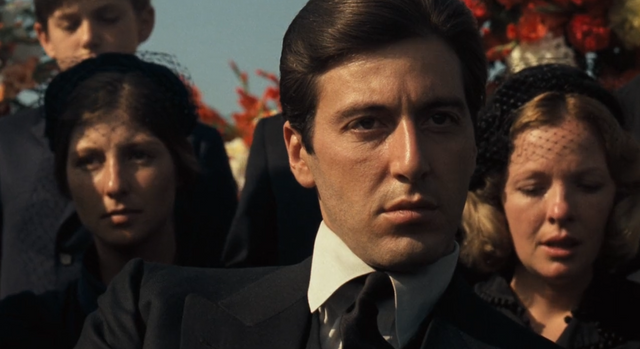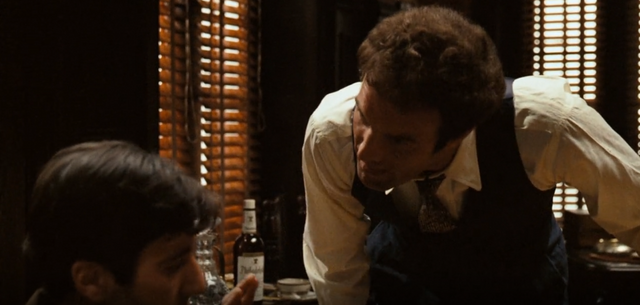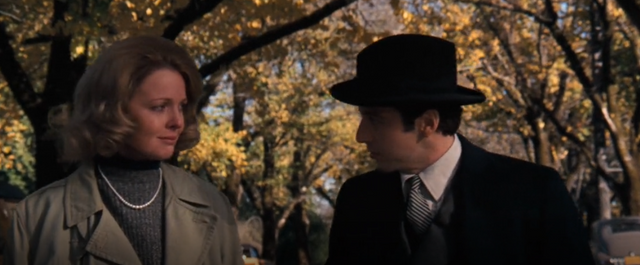A look at Michael Corleone, the main protagonist in Mario Puzo and Francis Ford Coppola's classics. Michael's downfall is examined psychologically, as well as why Kay was so important to him.
Michael Corleone at his father's funeral, The Godfather 1972.
"That’s my family, Kay. It’s not me."
That's what Michael says to Kay after describing how his father, Don Vito Corleone (with the help of Luca Brasi), had forcefully convinced Johnny Fontane's bandleader to sign a release agreement. Johnny went on to become a big star. The conversation between Kay and Michael takes place at his sister's wedding. In the scene, Michael is wearing his US Marine Corps uniform, which we must not overlook. In fact, we learn in the books that Life did a feature on Michael, commending him for his deeds during the war[1]. Yet if you've seen the movies, you indubitably know that by the end of the story he has fallen from this position of purity into something dark and tragic—losing himself and most of his family in the process. How could this happen to someone as intelligent and honorable as Michael Corleone?
Enter The Shadow
Psychologist Carl Jung had many interesting ideas. One of which was the archetype called the shadow. Jungian archetypes are thoughts and images deeply rooted within humans. They are Jung's attempt at describing patterns of behavior that show up universally across time and people. The shadow archetype is the unconscious and (often) dark side of the self[2]. Its behavior is erratic and wicked. It doesn't comply with the moral standards of the ego[3]—and it lurks within us all. So what are the implications and why are they important? As long as we are good people and behave ourselves, it should be fine. Right? No, actually, that's not good enough. Jung explains that the shadow can overwhelm a person when they experience a sudden upset. And if we underestimate its unyielding presence and make careless decisions, we can then become slaves of our shadow. Close observation of Al Pacino's character explains how that might happen.
Sonny warning Michael that not all wars are the same, The Godfather 1972.
In the case of Michael Corleone, the upset is a culmination of two events. First when his father wanted to buy some oranges and was almost killed in an assassination attempt. This prompted Michael to take part in exacting revenge. Sonny, his elder brother, laughs at him for suddenly volunteering to do the dirty work as part of the family business. Michael replies: "It's not personal, Sonny. It's strictly business." So he is justifying a violent act of revenge by claiming it is only to protect his father. After the hit on Don Corleone's enemies, the family arranges for Michael to flee to Sicily, where he spends about two years before it is safe for him to return. During his absence, the Corleone family continues to struggle as the Five Families head into a war. Having fled to Sicily, Michael appears to be physically shielded from the chaos and unable to help with the family business. Consequently, the shadow is still somewhat contained. He finds (what seems to be) his only true love in the story, whom he marries: Apollonia, a Sicilian girl. Just before returning to New York as a newlywed, however, Michael is betrayed by one of his bodyguards and Apollonia is killed—a car bomb which was intended for him. This is where Michael becomes a slave of his shadow.
The Significance of Kay
When we were first introduced to Michael and Kay (at the wedding), they sat at a secluded table outside of his father's office—away from the rest of the family. He projects the deficiencies he deems immoral onto his family and judges them for it[4]. He represses those same thoughts and feelings in himself, because they don't align with his image of the ideal self. That might be his family, but it's not him. And Kay believes him. Although she has a seemingly small role in the story, she is essential to Michael's character development. From a Jungian perspective, she can at times be viewed as a reflection of Michael's conscious ego. Two of their conversations demonstrate this well. The first takes place right after Michael returns to New York from Sicily. Michael tells Kay that he is part of his father's business now:
KAY : But you're not like him, Michael. I thought you weren't going to become a man like your father. That's what you told me.
MICHAEL: My father's no different than any other powerful man. Any man who's responsible for other people. Like a senator. Or a president.
KAY: You know how naive you sound?
MICHAEL: Why?
KAY: Senators and presidents don't have men killed.
MICHAEL: Oh? Who's being naive, Kay?
The last line in this excerpt accurately reflects how Michael's conscious ego is unable to see the harm that people in traditional high-status positions are capable of inflicting[5]. And the shadow points this out. It isn't precisely clear how much time there is between Apollonia's death and his reunion with Kay, but upon his sudden visit Michael proposes to Kay:
MICHAEL: Please, Kay. I'll do anything you ask... anything to make up... for what's happened to us...
...because that's important Kay. Because what's important is that... we have each other. That we have a life together... that we have children. Our children...
Kay... I need you. And I love you.
We are reminded of the Jungian role that Kay represents when the two are seen dancing early on in The Godfather: Part 2. Kay notes to Michael that it's been seven years since he promised her that the Corleone business would be "completely legitimate in five years". This is an update as to where Michael stands in his individuation process: the conscious ego is nowhere near assimilating the shadow—bad news, but it will make for an excellent movie.
Fast forward to a later scene in Part 2 and there is another back and forth between the shadow and the conscious ego. The conversation takes place in a hotel room shortly after Frank Pentangeli's trial. Kay confronts Michael about the odd way Pentangeli backed out of selling Michael out and tells him that she is leaving with the kids. Michael is having none of it:
MICHAEL: No, I don't want to hear anything. There are things between men and women that will not change; things that have been the same for thousands of years. You are my wife, and they are my children... and I love you and I will not let you leave, because you are mine!
The unconscious wearing darker tones than the conscious, The Godfather 1972.
A thing to note about their relationship is that these conversations are the only times Michael tells Kay that he loves her. In both instances he is trying to manipulate Kay. Why does Michael go through all this trouble? Why isn't Kay allowed to leave? Wouldn't the shadow have unbridled rule if Kay leaves? In order for the self to become whole, it must integrate the shadow—in a process called individuation. Successful individuation would be when we assimilate the unconscious into the conscious. But what is happening in the scenes above is the exact opposite—the shadow is attempting to integrate the ego. Essentially, this is what it's saying: "Hey conscious ego, don't fight back. I'm just going to do this one little thing and I'm doing it because I love you." As Kay offers little resistance (especially in the conversation when Michael proposes to Kay) and shows little sign or effort to either repress or come to terms with the shadow, it's no wonder Michael's actions get so out of hand. Their conversation continues:
KAY: Oh, I do feel things for you, Michael. But now, I think it's pity. For the first time since I've known you, you seem so helpless. You held me a prisoner once; will you try again?
MICHAEL: If that's what it takes, then yes, I will.
As merely a reflection of Michael's ego, Kay isn't personally to blame for any of his actions. And when Kay says she feels pity for Michael, she is in a way speaking for the audience—and confirming what they probably suspect by this point: Michael has fallen into a role that approximates Aristotle's tragic hero. Kay's retreat marks a low point of Michael's chances of integrating the unconscious and the conscious, of completing the individuation process, of the self becoming whole.
Death
"Just when I thought I was out, they pull me back in!"
This iconic quote from The Godfather: Part 3 wholly demonstrates that "when an inner situation is not made conscious, it happens outside, as fate."[6] So a Jungian interpretation is that even deep into Part 3, there is still a disconnect between Michael's consciousness and unconsciousness. When he says they are pulling him back in, he is affirming that factors outside of his control (i.e. fate) are keeping him in this life of crime—in darkness. He doesn't stop to think it could be his own decision to jump back in and that he is just as dark as he thinks the world around him is.
As cool as Michael Corleone seems in the Godfather movies, he is a deeply flawed man. Unlike Vito Corleone, Michael lacks the introspection to come to terms with his nature. Vito didn't apologize, because "that's [his] life" and made it clear in his meeting with Sollozzo that "it doesn't make any difference to [him] what a man does for a living." He didn't project his shadow onto others and he didn't judge other people for their career choices. He didn't feel shame. This starkly contrasts Michael's view of himself and his surroundings. He inherited his father's talents to become a successful crime boss, but not the wisdom to be able to live with it. In the end, Michael dies in the same courtyard Apollonia was killed. The place where he was supposed to die many years ago. The place where his metaphorical self did die many years ago.
Footnotes
[1] In both the book and the movie, Vito has always had high hopes for Michael. However, in the book it seems that Vito actually did want Michael to follow his footsteps in becoming the head of the family. In the movie, Vito clearly wanted a different life for Michael: "Senator Corleone.... Governor Corleone.... or something..."
[2] Strictly speaking, the shadow does not always entail negative qualities. But they chiefly involve primitive emotions such as uncontrolled rage and greed—emotions we must repress in order to be accepted in our society.
[3] The ego is the conscious part of the self and, according to Jung, a very small part at that.
[4] Family members are common dupes of Freudian projection.
[5] Being a war hero and a student at an Ivy League school, Michael seemed on track to becoming a pezzonovante.
[6] Jung in Aion.



Nice plz visit my post
Downvoting a post can decrease pending rewards and make it less visible. Common reasons:
Submit
✅ Enjoy the vote! For more amazing content, please follow @themadcurator for a chance to receive more free votes!
Downvoting a post can decrease pending rewards and make it less visible. Common reasons:
Submit
Hello @henrymencken! This is a friendly reminder that you have 3000 Partiko Points unclaimed in your Partiko account!
Partiko is a fast and beautiful mobile app for Steem, and it’s the most popular Steem mobile app out there! Download Partiko using the link below and login using SteemConnect to claim your 3000 Partiko points! You can easily convert them into Steem token!
https://partiko.app/referral/partiko
Downvoting a post can decrease pending rewards and make it less visible. Common reasons:
Submit
Congratulations @henrymencken! You received a personal award!
You can view your badges on your Steem Board and compare to others on the Steem Ranking
Vote for @Steemitboard as a witness to get one more award and increased upvotes!
Downvoting a post can decrease pending rewards and make it less visible. Common reasons:
Submit